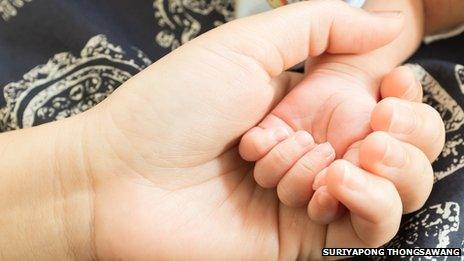Warning over 'marked' adoption-rate fall
- Published

Research stresses the importance of children having a loving and stable family
There has been a marked drop in the number of children being put up for adoption, leading charities have said.
Several court rulings have underlined local councils' need to consider all options, such as placing with birth relatives, before seeking adoption.
Unreleased figures, cited by the Independent newspaper, show a 50% drop in adoptions between 2013 and 2014.
Adoption UK said the fall could mean children remaining in abusive and neglectful families for too long.
Its chief executive, Hugh Thornbery, said: "We're very concerned that there has been such a marked drop-off in the number of children being considered for adoption.
"That leads us to believe that children aren't being considered for adoption who should be."
'Good solution'
He added that approved adopter families were also waiting longer to be matched with children because of the reduced flow of children coming through the system.
It comes after the previous coalition government attempted to speed up the adoption process, criticising local authorities for dragging their heels on adoptions.
In November 2013, Sir James Munby, who is president of the family division of the High Court, ruled the education secretary's six-month target for adoptions should not be allowed to break up families unnecessarily.
He said grandparents and other family members should be considered before children were placed for adoption.
According to the Independent, the rate of adoptions fell from 1,550 in the summer of 2013 to 780 in the summer of 2014.
The Department for Education would not confirm the figures and said it would be publishing statistics for this period in due course.
John Simmonds, director of policy, research and development for British Association for Adoption and Fostering, told the BBC research made clear that children needed loving stable families from the start.
'Significant act'
"Their development is centred on that family for life. If that can't happen for birth parents and birth families, then adoption is a good way to solve that," he said.
But Mr Simmonds added that judgements in the Supreme Court and the Appeal Court were reminding lower courts and local authorities that "the forceful termination of a legal relationship between a child and their parents is a very significant act".
"For children who are abused or neglected, if you are absolutely clear that there's no other way of dealing with them than adoption, then there has to be very strong evidence that the local authority has explored all other options."
He suggested that there may be "a degree of hesitancy" in placing children for adoption because of these rulings.
He said the option of "special guardianship" arrangements with a child's grandparents or other relatives was being used more as a way of finding a suitable half-way house that did not sever totally the child's ties with the family or leave the child in an abusive or neglectful situation.
'Streamlining'
A Department for Education spokeswoman said there had been a drop in the number of children with an adoption decision.
"We believe this is a result of the way local authorities have interpreted some court judgements. The Adoption Leadership Board has published a 'mythbuster' guide to clarify what these judgments mean and to allow clear and confident adoption decisions to be made.
"We are monitoring the impact of the new guidance and what happens to the numbers very closely."
She added: "Where adoption is in the best interests of the child it is right that they are placed with their new family as soon as possible. This is why we will set up regional adoption agencies to streamline this process and match children with the best parents for them."